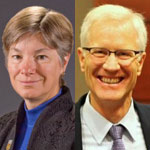Updated Wednesday, Jan. 29: Dr. Larry James’ leadership skills and record of accomplishments in higher education made him a strong candidate for this position. In searching for a dean, NAU’s goals include finding the right match between a candidate’s skills and the college’s needs. After extensive discussions in the university community, Dr. James’ candidacy will not be pursued and he will not be visiting campus.

Dan Kain, Vice Provost for Academic Personnel
Northern Arizona University is currently searching for a new dean of the College of Social and Behavioral Sciences—seeking to identify an effective, visionary leader for a large and important academic unit. When current Dean Stephen Wright chose to withdraw from the search last fall, the search committee focused on identifying the strongest, most highly qualified candidates in the applicant pool. Three finalists came to campus for interviews late last semester; recently the search committee recommended (and the Provost’s Office concurred) that one of those finalists be invited back for further conversation, and two additional highly qualified finalists also be invited for campus interviews.
As the search committee had already learned, one of these finalists had come under scrutiny in the past for allegations related to his prior military service. These allegations have been thoroughly investigated in several legal and professional venues and dismissed each time. His current employer investigated the allegations quite thoroughly and found no basis whatsoever for them. Our own reference checks to date have uncovered absolutely no evidence supporting the allegations, as well as many strong endorsements and commendations. Thus we invited him to come for a campus interview; he has stated that he looks forward to the interview and the opportunity to engage in open discussion with our university community.
Sadly, some individuals (including students) are seeking to prevent his interview and visit. Intimidating flyers are being posted anonymously, and messages have been flying around campus urging people to “check out” the person via Google or other quick web searches. This behavior is inconsistent with the university’s commitment to civil discourse and fair evaluation of individuals. Indeed, our search process has consistently instructed committee members NOT to search the Internet to learn about candidates, both because of the inaccuracies promulgated on the web and because of the potential for discrimination. Our process is built around our deep respect for giving everyone a fair chance in the hiring process.
As a community, we need to re-examine what is important to us and how we live out the very principles we articulate.
First, we believe a university community should uphold the core values of thoughtful evaluation of evidence (rather than a rush to judgment based on unverified Internet accusations). As in all such searches, the process of a campus visit and continued reference checking are meant to provide deeper insights into the leadership potential and vision of the candidate. We ask and expect the university community to engage thoughtfully and respectfully in this process. This is also a teachable moment for our students. There should be careful attention to distinguishing accusation from fact. How many faculty members would accept a student paper as credible with a citation to a single (non-scholarly, non-documented) website or its spinoffs?
Second, we remind our colleagues that Northern Arizona University is committed to values of thoughtful dialogue, free speech and respect for diverse opinions. On our campus, as happens elsewhere, there are broad declarations of commitment to freedom of expression and appreciation of diversity, while in reality some political or social perspectives are actually suppressed by intimidation or loud voices. The call to prevent one of our finalists from coming to engage in dialogue with the college is interfering with the full, fair consideration of a diverse and highly qualified individual.
We find it ironic—worse than ironic, painful—that a university community committed to social justice, diversity and the protection of individual voices would rush to condemn a person based on unproven allegations that have been dismissed in prior investigations. Protests and demands to prevent that person’s freedom of speech are incompatible with the values of civil discourse, social justice and commitment to fair treatment for diverse candidates. We ask that the university community reaffirm these values in the next steps of this search and in all university operations.



